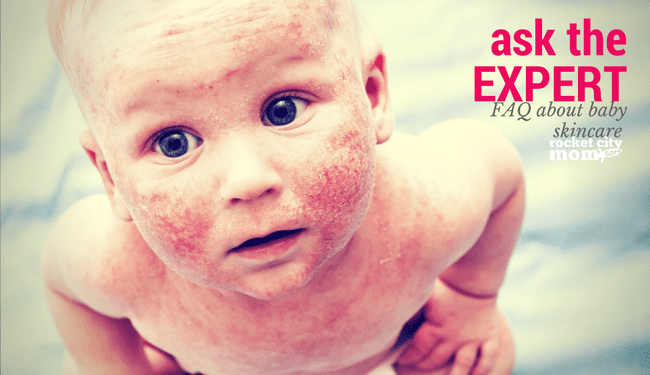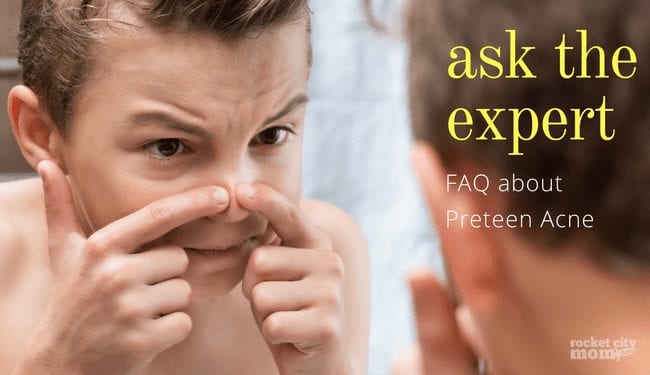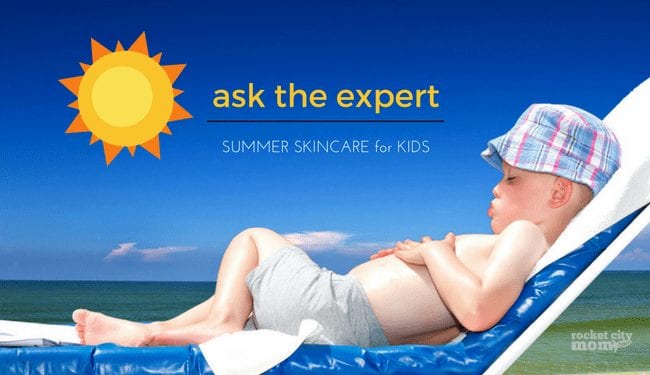Ask the Expert: Skincare for Mom, Decade By Decade

At what age should you visit a dermatologist? What’s the difference between retinol & retinoids? How can moms combat the effects of pregnancy on their skin? We asked an expert for a skincare checklist for our 20s, 30s, 40s, and 50s. Here’s what he said.
Skincare in Your 20s
Signs of aging do start to appear but there is still a great opportunity for prevention and thinking ahead. Limiting, alcohol, tobacco or other drugs is very beneficial to long-term skin care. Of course, using sunscreen (along with sun protective behaviors) to prevent cellular DNA damage and the effects on collagen and elastin is essential.
Medically well-studied topical products can certainly be of benefit. This is beyond any product that your neighbor is selling or that a company or store using their own non-medical, non-independent before and after photos can offer. There is a difference. Prescription-strength retinoids (retinols are the over the counter, less potent relative) are one proven product.
Q.) If I’ve never been as a young adult, what age should I visit a dermatologist?
Most things related to skin – cosmetic or otherwise – are easier dealt with early, usually in the 20s or 30s. At the very least, it is a good baseline to assess your sun damage compared to your peers. Dermatologists routinely find precancerous and cancerous spots in this age group, though the rate is not as high as in the following decades.
Q.) How can pregnancy affect a woman’s skin?
Often pregnancy is part of the 20s or 30s. Varicose veins, stretch marks, hair growth, discolorations, hair loss and acne are common occurrences. Evaluation by a dermatologist can help you better control these complaints. Any hormonal changes need to be addressed by the gynecologist or endocrinologist as well. There are numerous over-the-counter, cosmeceutical, and prescription options for acne.
The most common changes are skin darkening in various locations (including the areolas, abdomen, face, and groin), hair growth in new areas, stretch marks, acne, pregnancy-related dermatoses (a larger topic that we won’t expand on) and fat deposition in new locations. All of these can be addressed by different methods and to varying levels of success.
Skincare In Your 30s
Lines and wrinkles do tend to become more prominent during this decade. It is still early enough to strongly lean on prevention to help the long-term appearance of the skin. However, intervention would ideally be started by this time to make your regimen more simple.
Again, sun protection with sunscreen is key and avoiding harmful exposure to smoking, drugs and alcohol should be avoided. If you haven’t started by now, regular self skin exams should be done monthly with dermatology exams as determined by your exam and history. Retinoids should definitely be a part of your regimen as a foundation.
Q.) Should I be checking for skin cancer & sun damage similar to the way I get regular breast exams?
Yes, we typically recommend full skin self-exams approximately monthly. You can pick a day to be your established day so that you don’t forget. Look for new or changing spots or areas that hurt, bleed or itch. This assists your dermatologist when you have your formal examinations with them.
Q.) What diet & nutrition tips should I keep in mind for skin health as I get older? Are there any multivitamins that can help my skin?
Overall healthy activity and diet recommendations should be followed. Maintaining an ideal body weight can prevent or help with many skin conditions. Hydration with plenty of water is good for your body and for your skin.
There is not good evidence for supplements or “magic cures” that claim drinking or eating a product can fix all of your skin woes and provide adequate UV protection. There have been recent studies for nicotinamide (niacinamide) use in pre-cancer and cancer prevention, but this is typically for more severely sun-damaged patients. While a balanced diet provides enough resources for your skin, a multivitamin won’t hurt at all. If you know that your diet is low in certain areas, Vitamin E, Vitamin D specifically, feel free to add that to your regimen.
Skincare In Your 40s
If not earlier, most people start to show the signs of sun exposure and aging by this time. You should still emphasize the preventative care such as sunscreen, sun smart behavior, and avoidance of alcohol, tobacco and drugs. If not already doing so, improved eating habits and exercise keep the skin and body as a whole more healthy. If you have not already started daily retinoid use, then now is definitely the time. The longer you use this product the more benefit you can achieve.
You should definitely be watching your skin for new, changing or symptomatic spots. Routine exam, or at least a baseline check, is a good idea by this time. Often skin cancer or other diseases of the skin start developing around this age.
Q.) When does skin texture and elasticity start to change more rapidly?
People vary in their aging milestones but most people will have evidence by their 40s. Typically those that have been exposed to higher levels of ultraviolet radiation (through outside sun exposure or tanning beds) and people with more fair skin show changes earlier. If you are looking for a reason other than skin cancer to avoid tanning, we see a tremendous difference in skin quality between people who tan and people who don’t.
Q.) What is a good amount of retinol I should be using in my 40s?
Remember that retinol is the lower strength over-the-counter version of a prescription retinoid. Your ideal goal would be to use it to the entire face – it is not a spot treatment product – nightly. If you start with a retinol then your goal should be to eventually get to a retinoid. For retinoids, your goal should be to work to the highest strength that you can tolerate nightly use of. Regardless of what some products claim, there is not an equivalent non-prescription version of a retinoid so don’t be misled to waste your time, effort and money chasing that idea.
Skincare In Your 50s and Beyond
At this age, you should be continuing or initiating several of the options previously mentioned. Retinoids are still a solid foundation for long-term skin health.
In your 50s, a combination of multiple therapies is not necessary to show improvement but the more pieces of the puzzle that you incorporate, the more significant and impressive your results will be. Skin exams are important now as well. The frequency of skin cancer and pre-cancer is very high by this age. Catching them early can help prevent more significant detrimental effects.
For all ages, there are many preventative and therapeutic options available that could be discussed with a dermatologist based on your personal history and examination. Cosmetic options for those who wish to pursue them are also options. Talk with your dermatologist for the latest advancements in skincare.
You Might Also Like…
- Preteen Acne: When Puberty Smacks You in the Face
- Your Sunscreen Myths Debunked by an Expert
- Confessions of a Dry Shampoo Convert
 ABOUT THE EXPERT: Dr. Albert E. “Bo” Rivera is a licensed physician and surgeon at Southeastern Skin Cancer & Dermatology, board-certified diplomat of the American Osteopathic College of Dermatology, a fellowship-trained member of the American College of Mohs Surgeons as well as member of several dermatology and medical specialty organizations such as the American Society for Dermatologic Surgery, American Society for Mohs Surgery, American Academy of Dermatology, Skin Cancer Foundation and the Madison County Medical Society. Dr. Rivera also enjoys time with his wife, Stephanie, a daughter who was born in 2015 and their Labradoodle.[/themify_box]
ABOUT THE EXPERT: Dr. Albert E. “Bo” Rivera is a licensed physician and surgeon at Southeastern Skin Cancer & Dermatology, board-certified diplomat of the American Osteopathic College of Dermatology, a fellowship-trained member of the American College of Mohs Surgeons as well as member of several dermatology and medical specialty organizations such as the American Society for Dermatologic Surgery, American Society for Mohs Surgery, American Academy of Dermatology, Skin Cancer Foundation and the Madison County Medical Society. Dr. Rivera also enjoys time with his wife, Stephanie, a daughter who was born in 2015 and their Labradoodle.[/themify_box]

As a hyper-local website focused on all aspects of parenting in and around Morgan County, and the Tennessee Valley, River City Mom occasionally asks local parents to submit their stories for publication. This is part of our continual effort to represent varied viewpoints and experiences on our site. However, these articles should not be seen as necessarily expressing the views of Rocket City Mom Media Group, LLC.







